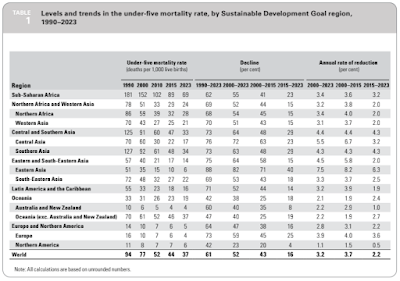‘Funding cuts threaten progress in reducing child mortality’
KARACHI: The World Health Organisation (WHO) has expressed concerns that significant funding cuts to aid programmes may undermine the progress made in reducing child mortality worldwide. Despite a decline in child deaths globally, with 4.8 million deaths reported in 2023, the organisation warns that reduced funding for life-saving programmes is causing healthcare worker shortages, clinic closures, and disruptions to vaccination programmes.
According to the United Nations Inter-agency Group
for Child Mortality Estimation (UN IGME), the number of child deaths has
dropped by more than half since 2000, and stillbirths have declined by over a
third. However, the reports also highlight that progress has slowed, and too
many children are still being lost to preventable causes.
"In 2022, the world reached a historic milestone when child deaths dropped slightly below 5 million for the first time," the reports noted. However, the Inter-agency Group warned that global funding cuts could undermine monitoring and tracking efforts, making it harder to reach the most vulnerable children.
The WHO Director-General, Dr Tedros Adhanom
Ghebreyesus, emphasised the need for collaboration to protect and improve
children's health, stating that "from tackling malaria to preventing
stillbirths and ensuring evidence-based care for the tiniest babies, we can
make a difference for millions of families."
Almost half of under-five deaths happen within the
first month of life, mostly due to premature birth and complications during
labor. Beyond the newborn period, infectious diseases, including acute
respiratory infections such as pneumonia, malaria, and diarrhea, are the
leading causes of preventable child death.
In Pakistan, the neonatal mortality rate stood at 37.6 deaths per 1,000 live births, and the under-five mortality rate was 58.5 deaths per 1,000 live births in 2023, according to UN IGME reports.
Better access to quality maternal, newborn, and
child health care at all levels of the health system will save many more lives.
UNICEF Executive Director Catherine Russell noted that "millions of
children are alive today because of the global commitment to proven
interventions, including vaccines, nutrition, and access to safe water and
basic sanitation."
The UN IGME members call on governments, donors, and partners across the private and public sectors to accelerate efforts towards protection of the hard-won gains in saving children's lives.
To address this issue, UN IGME highlights several
critical areas that require immediate attention:
- Reducing healthcare worker shortages: Ensuring that healthcare workers are adequately trained and deployed to areas with high child mortality rates.
- Improving access to essential supplies: Ensuring that essential supplies, such as malaria treatments, are available and accessible to those who need them.
- Enhancing
monitoring and tracking efforts: Improving
data collection and analysis to better understand the causes of child mortality
and track progress towards reducing it.
IV News Desk
Charts and images courtesy: UN agencies.







Comments
Post a Comment